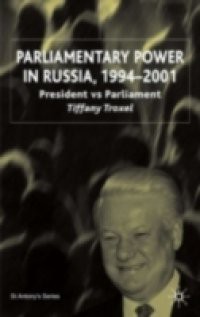This is the first study of the Russian parliament's influence and power in the policy process from 1994 to 2001. Tiffany Troxel challenges the widely held view that during this period Russia operated under a presidential system with a strong, authoritarian leader who ruled by decree and a weak parliament which did not wield much power. This book explains how relations between the executive and legislature fluctuated between confrontation and co-operation during this period. Explanations for this crucial trend include President Boris Yeltsin's failing health, the appointment of the Parliament's choice of Prime Minister Yeveniy Primakov, economic crises, Yeltsin's diminished public support, the enhanced ability of parliament to form coalitions and the ever-shrinking areas in which the President could issue decrees. Parliament's assertion of power and its challenge to the executive's authority meant the introduction of significant checks and balances. This is of critical importance to the development and stability of democracy in Russia.

